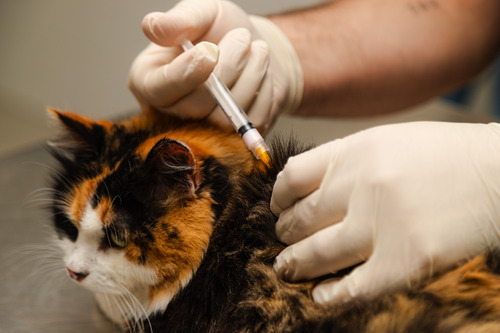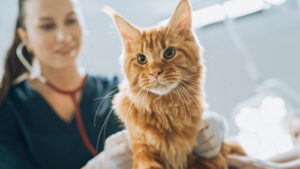Cats bring so much joy into our lives with their playful antics and soothing purrs, but as pet owners, we have a responsibility to protect their health. One of the most effective ways to do this is by ensuring they receive their vaccinations on time. Vaccines play a crucial role in preventing serious diseases and safeguarding your cat’s overall well-being. If you’re a pet owner in Loveland, OH, you may wonder why vaccines are so important and how they benefit your feline friend. Let’s dive into the critical reasons why cat vaccinations are essential and how they can make a lifelong difference in your cat’s health. For expert care and cat vaccination services, call Loveland Regional Animal Hospital at (513) 697-9796 or book an appointment online today!
What Are Cat Vaccinations, and Why Are They Necessary?
Cat vaccinations are carefully formulated injections designed to protect your feline companion from specific infectious diseases. These diseases can range from mild and treatable to severe and potentially life-threatening. Vaccines work by stimulating your cat’s immune system to recognize and combat harmful pathogens, creating a layer of protection that helps them stay healthy.
In many cases, vaccinations can significantly reduce the severity of symptoms. Common diseases targeted by cat vaccinations include feline herpesvirus, calicivirus, feline panleukopenia, and rabies. Each of these diseases can have devastating effects if left unchecked, making vaccinations a vital part of your cat’s preventive care. When a high percentage of cats in your area are vaccinated, it minimizes the spread of diseases, especially those that can jump between animals. This concept, known as herd immunity, keeps all pets safer.
Core Vaccines vs. Non-Core Vaccines
Not all vaccines are created equal. Cat vaccinations are typically divided into two categories: core vaccines and non-core vaccines. Understanding the difference helps ensure your cat receives the appropriate protection based on their lifestyle and risks.
Core Vaccines
Core vaccines are considered essential for all cats, regardless of their age, environment, or habits. These vaccines protect against diseases that are either widespread or pose a significant threat to public health. The main core vaccines for cats include:
- Feline Herpesvirus (FHV-1): Protects against a highly contagious respiratory infection.
- Feline Calicivirus (FCV): Prevents another common respiratory virus that can lead to severe mouth ulcers and chronic illnesses.
- Feline Panleukopenia Virus (FPV): Guards against feline distemper, a deadly viral infection.
- Rabies: A legally required vaccine in many areas that protects against a fatal disease transmissible to humans.
Non-Core Vaccines
Non-core vaccines are recommended based on your cat’s lifestyle, environment, and specific risk factors. For example, if your cat spends time outdoors or comes into contact with other animals, your veterinarian may suggest additional vaccines such as:
- Feline Leukemia Virus (FeLV): Recommended for cats older than 1 year that roam outside or have close contact with other cats.
- Bordetella: Helps prevent respiratory infections, especially in multi-cat households or catteries.
Your veterinarian at Loveland Regional Animal Hospital can guide you on which vaccines are necessary for your cat’s unique needs. Call (513) 697-9796 to schedule a consultation today.
When Should You Vaccinate Your Cat?
Timing is everything when it comes to cat vaccinations. Kittens and adult cats have different vaccination schedules, so it’s important to know when to bring your feline friend to the vet.
Kitten Vaccinations
Kittens are especially vulnerable to diseases because their immune systems are still developing. They receive some protection from their mother’s milk, but this immunity wanes over time. That’s why kittens should start their vaccination series at 6–8 weeks of age. Core vaccines are administered in a series of boosters every 3–4 weeks until the kitten is around 16 weeks old. This ensures their immune system is properly primed to fight off diseases as they grow.
Adult Cat Vaccinations
For adult cats, vaccines are generally given on an annual or triennial basis, depending on the type of vaccine and the manufacturer’s recommendations. During regular wellness visits, your veterinarian will evaluate your cat’s vaccination status and determine whether any boosters are needed. By staying on top of your cat’s vaccine schedule, you provide them with lifelong protection against harmful illnesses. If you’re unsure about your cat’s vaccination timeline, call Loveland Regional Animal Hospital at (513) 697-9796 to book an appointment.
Are Vaccines Safe for Cats?
Many pet owners worry about the safety of vaccines, but the benefits far outweigh the risks. Vaccines are extensively tested to ensure their safety and effectiveness, and most cats tolerate them without any issues. Mild side effects, such as slight swelling at the injection site or temporary lethargy, may occur in some cases. However, serious adverse reactions are extremely rare. Your veterinarian will discuss potential side effects with you before administering any vaccines and monitor your cat for signs of an allergic reaction. By vaccinating your cat at a trusted veterinary practice like Loveland Regional Animal Hospital, you can feel confident knowing they are receiving high-quality care. If you have questions or concerns about vaccine safety, reach out to our team at (513) 697-9796.
How Do Vaccines Support Your Cat’s Long-Term Health?
Vaccinations protect your cat from serious illnesses, helping them live a healthier, longer life. Vaccinated cats are less likely to experience complications from preventable diseases, reducing the need for emergency care or costly treatments. Unvaccinated cats face higher risks of chronic conditions, organ damage, or even fatal outcomes from diseases like feline panleukopenia or leukemia.
Beyond individual health, vaccines also fulfill legal and ethical responsibilities, such as rabies vaccination requirements. Keeping your cat vaccinated minimizes risks to other pets and humans while ensuring their immune system remains strong and resilient over time.
How Loveland Regional Animal Hospital Can Help
When it comes to cat vaccinations, having a trusted veterinary partner is essential. At Loveland Regional Animal Hospital, we take the time to assess your cat’s unique needs, recommend the appropriate vaccines, and create a personalized care plan. Our experienced team is committed to providing a safe and stress-free experience for both you and your cat. Whether your cat is due for their annual boosters or you’re welcoming a new kitten into your home, we’re here to help. Call us today at (513) 697-9796 to schedule a vaccination appointment or book an appointment online through our website.





